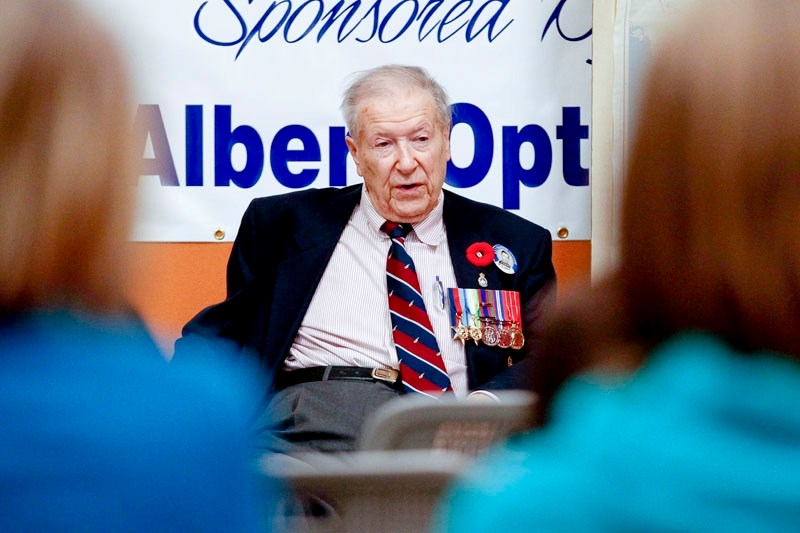Monte Stout has a lot to say about his experiences with the Royal Air Force (RAF) in the Second World War. That’s probably why he’s on the roster of speakers with the Memory Project, and it’s also why he showed up at the St. Albert Public Library last Wednesday to share his many stories.
The Memory Project is an initiative of the Historica-Dominion Institute, the largest independent organization solely dedicated to Canadian history, identity and citizenship. According to its website, www.historica-dominion.ca, its mandate is “to build active and informed citizens through a greater knowledge and appreciation of the history, heritage and stories of Canada.”
Certainly they are achieving that with Stout’s recollections stored in its digital archive and all of the live presentations that he continues to make. This is his busy time of year, he said, going out to speak once a day.
That’s pretty good for a 91-year-old who just came down with a cold, leaving him with a hoarse voice. Despite the ailment, he can still muster up the vocal stamina to recount the highlights of his service.
He joined the RAF in the fall of 1941 and was called for active duty in March the next year. While taking pilot training, his instructor was posted overseas and he was remustered as an observer. During this time, he took bombing and gunning training, navigation, reconnaissance and operational training.
He was then posted to the RAF Transport Command to ferry aircraft (mostly B-25 Mitchells) across the Atlantic. Most of his service was in the logistics of equipment availability for those who needed it for missions. His stories took place in Greenland and Iceland, and fighting oceanic storms around Ireland.
While he has no regrets about his service or the struggles to just stay warm while stationed in some high latitude base or another that didn’t have proper heating, he does harbour some ill feelings towards his former unit.
“I really detested the RAF, but it was nice to meet all the other people, you know the Norwegians, the Aussies, the English airmen were fine, but the administration was bad.”
He said that his father worked for a broadcaster in Calgary where some service people stayed to receive flight training.
“He found out that they were on English rations and English pay in Canada. He phoned (Prime Minister) Mackenzie King the next morning and they instantly got Canadian pay and Canadian food. They still cooked it terribly but at least they got more,” he recalled with a dry sense of humour.
The Memory Project’s Digital Archive contains the memories and memorabilia of more than 1,000 servicemen and women representing almost 85 years of military experience and a wide breadth of expertise. It offers everyone the chance to view hundreds of their personal artifacts from both world wars, the Korean War and other Canadian Forces operations to the present. Audio clips of Stout and other veterans recounting their stories are also available. Each interview also includes a print version for the hard of hearing.
Janice Cheung, the library’s special services co-ordinator, said that this was a special occasion for the approximately 20 attendees to the presentation. She said it was encouraging enough to warrant considering doing something similar for next year.
“I think it was just interesting to hear his experiences, things that we haven’t experienced ourselves. Just to know that all of these people had made lots of sacrifices for us to be where we are now.
“Some of the people – afterwards when we had finished – they stopped to come up and speak to Mr. Stout and tell him how much they enjoyed his talk. That was a good sign for me, too.”




